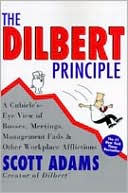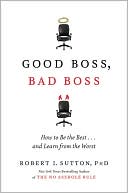Dilbert Principle: A Cubicle's-Eye View of Bosses, Meetings, Management Fads and Other Workplace Afflictions
Search in google:
The creator of Dilbert, the fastest-growing comic strip in the nation, takes a look at corporate America in all its glorious lunacy. These hilarious essays on incompetent bosses, rampant management fads, bewildering technological changes, and so much more, will make anyone who has ever worked in an office laugh out loud in recognition.The Dilbert Principle: The most ineffective workers will be systematically moved to the place where they can do the least damage -- management.Since 1989, Scott Adams has been illustrating this principle each day, lampooning the corporate world through Dilbert, his enormously popular comic strip. In Dilbert, the potato-shaped, abuse-absorbing hero of the strip, Adams has given voice to the millions of Americans buffeted by the many adversities of the work place... Library Journal Adams worked in a cubicle at Pacific Bell for nine years. From there he went on to pen the wildly popular cartoon Dilbert, which appears in over 700 newspapers. He is also the author of six Dilbert books (e.g., Bring Me the Head of Willy the Mailboy, Andrews & McMeel, 1995) and an electronic Dilbert newsletter, has a Web site on the Internet, and is a frequent speaker at business gatherings. His latest book of humorous essays and observations elaborates on the corporate scenarios depicted in his cartoons. The "Dilbert Principle" asserts that the most ineffective workers are systematically moved to the place where they can do the least damage: management. Chapters include such titles as "Machiavellian Methods," "Pretending To Work," and "Engineers, Scientists, Programmers, and Other Odd People." The book is replete with such advice as "Never walk down the hall without a document in your hand" and "The worth of any project is how it will sound on your rsum." He stresses the importance of using the word paradigm as often as possible, discusses the value of computers in pretending to be busy, and recommends that workers awaiting performance reviews openly display copies of Soldier of Fortune magazine on their desks. This cynical, satirical, all-too-familiar glimpse of corporate life is unabashed management bashing and is very funny. Recommended for all humor and business collections.Alan Farber, Northern Illinois Univ., DeKalb








